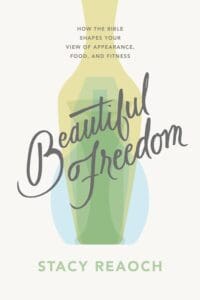- Home
- Spiritual Life
- How the Bible–and God–Define ‘A Beautiful Life’

How the Bible–and God–Define ‘A Beautiful Life’
 Excerpt taken from Beautiful Freedom: How the Bible Shapes Your View of Appearance, Food, and Fitness by Stacy Reaoch
Excerpt taken from Beautiful Freedom: How the Bible Shapes Your View of Appearance, Food, and Fitness by Stacy Reaoch
Chapter 1
A Beautiful Life
What do you think of when you hear the word “beauty”? Do you automatically think of that famous actress with the seemingly never-aging body and flawless skin? The woman on your exercise app who exhibits Hulk-like strength and fortitude? Maybe it’s the makeup stashed in your bathroom drawer that promises to erase wrinkles and create a beautiful face. Or maybe you’re thinking of some majestic mountains you hiked through on vacation.
I guess all of us want to live what we might call “a beautiful life.” You know, the kind of life you see on social media or in magazines. We want to look good and feel good—in our bodies, in our minds, in what we eat, and how we dress. But to find true beauty, we need to look first at God.
He is the one who paints the moon in the sky each night and causes the bright morning sun to rise. He puts the stars in the heavens and knows every hair on every person’s head. And he is himself beautiful.
In the book of Psalms, we see David reminding himself of the beauty of God in an unlikely situation: when he is being attacked and pursued by King Saul.
“One thing have I asked of the Lord, that will I seek after: that I may dwell in the house of the Lord all the days of my life, to gaze upon the beauty of the Lord and to inquire in his temple.” (Psalm 27:4)
Even in the midst of danger, David doesn’t say, One thing I ask: that I may be safe! None of the worries of David’s life seem to matter in comparison with having a relationship with God.
Is that how you and I feel? Not always! And particularly when it comes to issues around our bodies. It’s completely natural to want to look good and feel good, but very often that leads us into worry and fear. We worry about our attractiveness, we worry about weight, we worry that our bodies can’t do what they used to be able to do, we worry about how healthy we are or aren’t. It’s easy to become consumed with issues related to our bodies.
Let me ask you: Can you be free from body-image issues or counting calories or fearing that you won’t be able to fit into the dress in time for the wedding? Can you be free from the fear of aging, of adding a few pounds around your middle, or of going without your favorite food or drink?
Are you ready for that?
An Early Battle
For some of us, a fixation with our bodies starts early in life. My friend Jill shared her story with me. “My first memory of being concerned about my body image was from when I was just five or six years old. My dad looked at my chubby limbs and said, ‘You know, if you want to lose weight, you’re really going to have to work at it. Our genes are working against us.’”
Starting in elementary school, Jill began doing workouts and comparing herself to other girls. By eighth grade, she was reading food labels and counting calories, scrupulously watching her diet, and enjoying the attention she was getting for her looks. It seemed that the harder she worked at it, the more praise she got. The attention and compliments fueled her desire to lose weight. Jill’s battle with perfectionism led her to plastic surgery in her early twenties and a full-blown eating disorder a few years later.
Although she’d been raised in a Christian family, the all-consuming battle for beauty kept Jill’s eyes focused on self rather than on God. “Beauty is power,” she told me. “It was exhilarating to know I was turning heads each time I walked into the gym.” Dating a well-known bodybuilder and entering the world of competitions only added fuel to the fire.
As the praise of others fed her motivation, Jill kept moving down more and more dangerous paths to achieve her goals. A friend who worked in a pharmacy began illegally selling her Adderall, an addictive stimulant that kept her moving at a fast pace, feeling little need for sleep or food. But soon Jill’s body began to crash and she realized just how far she’d fallen—all in the name of health and fitness.
There are so many causes of our struggles with body image. Maybe we’re like Jill: someone close to us once said a hurtful comment about the way we look. Maybe we fear not being loved for who we are. Maybe we worry about not being healthy or strong enough. Or we’ve spent too much time online, looking at filtered images of fitness gurus that make us feel like we’re not up to snuff. Our struggles might be embedded in low self-esteem or compounded by mental illness.
For Jill, these struggles took a relatively extreme form; for many of us, it’s much more subtle. Maybe you never feel like your body is good enough. Or your time at the gym is spent comparing your body to the woman’s next to yours who seems perfectly fit. Or you feel out of control with the food around you. You may not be ready to get plastic surgery or forgo your favorite foods, but there is a constant grating in your mind over what’s wrong with your body.
Our culture is quick to point out quick-fix solutions to our problems, offering supposedly easy answers to our worries about our bodies. But as Christians, our approach to fitness, health, and beauty needs to be different. I don’t mean that hot yoga is out the window or that you should stop paying attention to your appearance: what I mean is that we need to take stock of our baseline assumptions about our bodies. We need to start by thinking about what the Bible says—and when we do, we’ll find that God has different ideas about what really, truly constitutes “a beautiful life.”
True Beauty
God, as our Creator, is the source of all physical beauty—but he himself is also the most magnificent display of beauty. This might sound strange—didn’t Jesus die a gruesome and horrific death on the cross? In what sense is he a marvelous display of beauty? Remember that beauty is more than outward appearance. Our definition of beauty says that it can arise from something like a person’s character or personality.
That’s what we think about when it comes to God’s beauty: his character. We can meditate on his boundless mercy that gave us new life in Christ—and not by any of our own doing, but by his grace alone. No amount of good deeds or kind thoughts can give us redemption from our sin, but only Jesus! What a marvelous, undeserved gift. We were once dead but are now alive! Isn’t that beautiful?
I remember reading the Bible for the very first time as a new believer in college. One day as I was sitting in my dorm room soaking up the parable of the lost sheep in Luke 15:1-7, I was overcome with God’s love for me. Tears spilled over as I realized that I was the lost sheep that had been found. Jesus’ love became so real to me—a beautiful display of the life-changing power of the gospel. God was giving me joy in things that I’d never experienced before! My eyes were open to new spiritual realities, and my newfound faith in Christ propelled me to share the good news with all the college students I knew (no matter how crazy I might have seemed).
Jesus Christ came to earth as a baby, suffered, bled, and died to take away our sin. His perfect obedience to the Father and his excruciating death on the cross paved the way for his enemies to be made friends. When we ponder what Jesus has done for us, freeing us from this dark world and giving us eternal life in him, we realize that he is the essence of beauty. His love is made manifest by his death and resurrection:
“God shows his love for us in that while we were still sinners, Christ died for us.” (Romans 5:8)
And this beauty doesn’t just inspire us: it changes us. When we are in Christ, our Father sees us as he sees Jesus. We are holy in God’s sight, blameless and unblemished (Colossians 1:22). This matters hugely! Maybe you feel ugly or fear being unloved. Or maybe you are in pain or frustrated by your body. Remind yourself that you already give pleasure and satisfaction to our heavenly Father. You are loved. You are beautiful.
…
Order your copy of Beautiful Freedom: How the Bible Shapes Your View of Appearance, Food, and Fitness by Stacy Reaoch.
Trending Now
Sign up today for your Inspiration Today Daily Newsletter
Supercharge your faith and ignite your spirit. Find hope in God’s word. Receive your Inspiration Today newsletter now!
Stacy Reaoch
Stacy Reaoch is a writer, pastor’s wife, and mother of four who resides in Pittsburgh, PA. She’s passionate about helping women apply gospel truth to the daily trials of life. Learn more at StacyReaoch.co
Related Articles
February 23, 2026
The Joy of Being His Workmanship
When life urges us to strive harder and do more, Scripture invites us to rest in a freeing truth:…
February 20, 2026
Stepping Out in Faith When God Calls You to the Impossible
Stepping out in faith often feels uncomfortable—especially when God calls you toward something that…
February 20, 2026
Finding Joy Is a Choice—Even When Life Is Hard
Sorrow doesn’t pause life—and neither does joy. If you’ve ever wondered how to find joy in…
February 19, 2026
The Secret to Supernatural Joy in Your Life
What if joy wasn’t tied to circumstances at all? Supernatural joy—the kind Jesus promised—can…
Next Steps To Strengthen Your Walk
Inspiration Today Newsletter
Supercharge your faith and ignite your spirit. Find hope in God’s word. Receive your Inspiration Today newsletter now!
Christian Articles
Find articles to strengthen your walk and grow your faith. We have a wide range of topics and authors for you.
Submit A Prayer Request
We are here for you. Simply click on the button below to reach us by form, email or phone. Together we will lift our hearts and voices with you in prayer.





